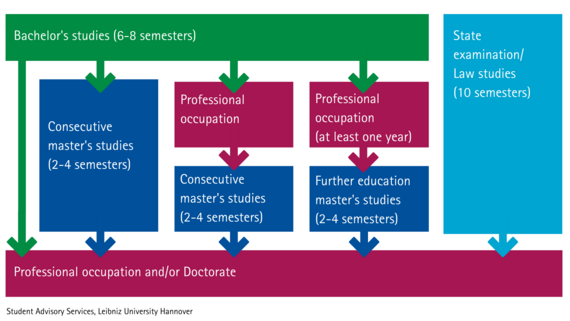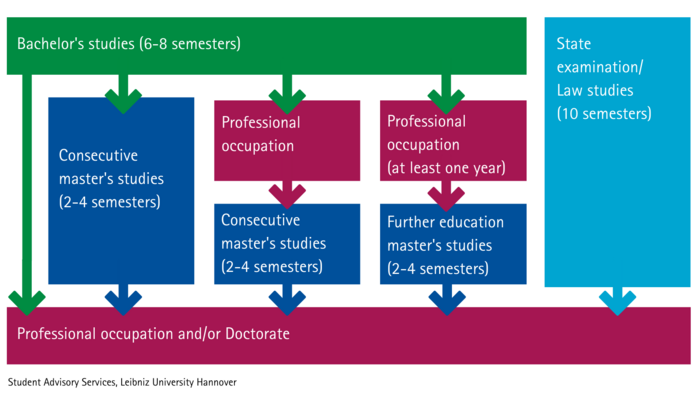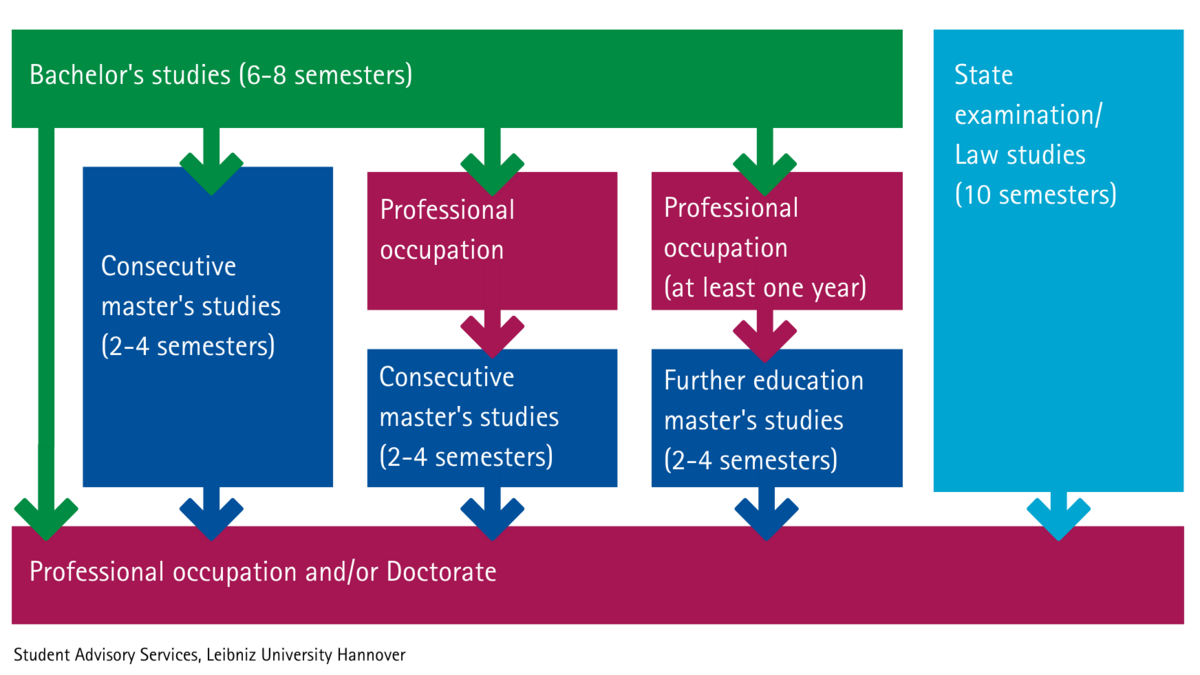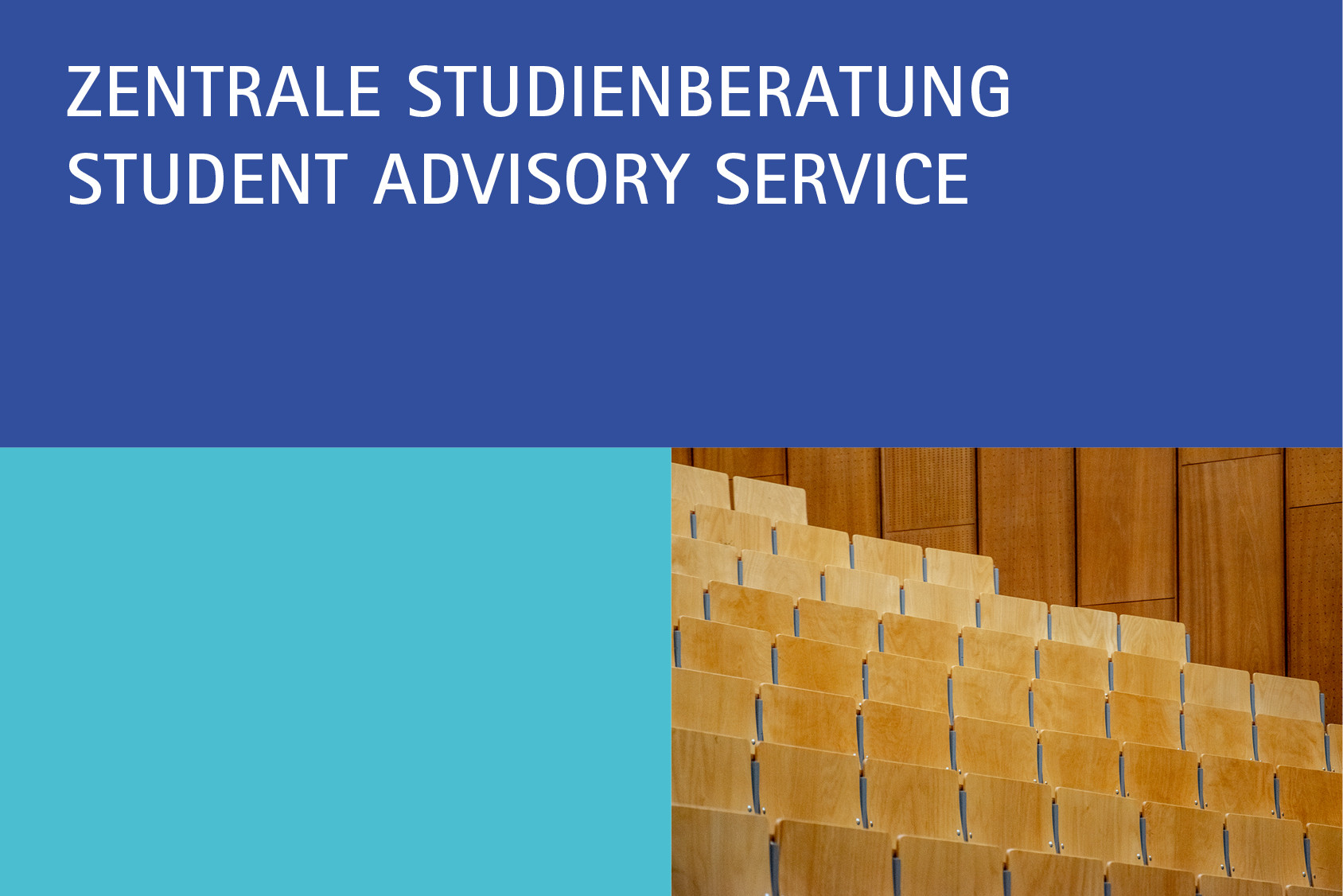Qualifications
At LUH, most study programmes are offered as bachelor’s and master’s degree programmes. The law course is the only degree programme that leads to a state examination. The degree qualifications have different names depending on the department. The title says nothing about the quality of the degree – it merely reflects the focus of the programme content.
Bachelor’s degree programmes
Most undergraduate programmes are bachelor’s degree programmes. A bachelor’s degree is an undergraduate or first academic degree that qualifies a graduate to enter a profession. However, university students usually go on to complete a subsequent master’s degree programme.
You can complete the following Bachelor’s degrees at LUH:
- Bachelor of Arts (B.A.)
- Bachelor of Science (B.Sc.)
- Bachelor of Law (LL.B.)
Master’s degree programmes
There are two different types of master’s degree programme: consecutive and continuing education master’s programmes.
Most master’s degree programmes are consecutive programmes. This means that they build on the content of a previous bachelor’s degree programme in the same area, and expand on the course content or extend the skills acquired in the undergraduate programme. As a result, master’s students are required to pursue the same or a similar subject area to the one they chose for their bachelor’s degree.
Continuing education master’s programmes are usually optional. However, some occupations require a master’s degree. Those wishing to become teachers, for example, must complete the appropriate teacher training master’s programme after graduating with a teacher training bachelor’s degree. A master’s degree is also generally expected in the natural sciences and for positions in research.
You can complete the following Master’s degrees at LUH:
- Master of Arts (M.A.)
- Master of Education (M.Ed.)
- Master of Law (LL.M.)
- Master of Science (M.Sc.)
State examination
Degree programmes in medicine, dentistry, veterinary medicine, law and pharmacy are offered as programmes that lead to a state examination. These degree programmes are regulated at the state or national level on the basis of state examination regulations. The state examination qualification is abbreviated to Stex or StEx.
Teacher training programmes
Teacher training programmes have an exceptional status. In Lower Saxony, these programmes are offered as bachelor’s and master’s degree programmes; nevertheless, the training to become a teacher concludes with a state examination after completion of the teacher training period (practical training phase after graduation).
Possible study paths and qualifications


 ©
Zentrale Studienberatung / LUH
©
Zentrale Studienberatung / LUH
Modules and courses
Modules – module catalogue
The content of the bachelor’s and master’s degree programmes is divided into different modules.
A module is a teaching unit comprising several courses on a specific topic. A module may consist of two lectures and one tutorial, for example, or of one lecture and two seminars on the same topic. Basic modules involve learning the basic content of a topic, while advanced modules provide the option of expanding on a field of knowledge. An advanced module builds on a basic module. A module usually lasts one or two semesters, and concludes with an examination.
Each degree programme has legally binding examination regulations specifying which modules are mandatory and which modules can be selected as required elective modules or elective modules (mandatory modules and modules that students can opt to take).
The module catalogue (also referred to as the module handbook) provides a summary and a description of all modules offered on a degree programme. It presents the content, scope, schedules and the lecturers responsible for the module.
Types of course
-
Lectures
Lectures involve a lecturer talking about a specific topic. Students listen and take notes. Sometimes the lecturer leaves time for discussion after the lecture. Lectures are a common form of teaching in the natural sciences and engineering, as well as in economics and law.
-
Seminars
Seminars are courses involving smaller groups where students are expected to play an active role. Content is often developed, discussed and debated with lecturers. Seminars are a common form of teaching in the social sciences and humanities.
-
Block seminars
Block seminars take place over several consecutive days, e.g. from Friday to Sunday, rather than once a week throughout the semester.
-
Tutorials
Tutorials are where students regularly meet under the instruction of more advanced students to go through the lecture material. Tutorials are held in small groups, similar to seminars. Tutorials are a feature of all degree programmes.
-
Exercise classes
Exercise classes enable small groups of students to expand on topics previously covered in a lecture, applying knowledge to practical examples.
-
Laboratory classes
Laboratory classes usually involve students independently conducting experiments, e.g. in the basic electrical engineering laboratory class. Laboratory classes are offered in engineering and natural science programmes.
-
Excursions
Excursions are external courses or field trips where a group goes outside the university to visit, explore or try out certain teaching content (e.g. exploring landscapes or other regions, visiting non-university institutions and museums, etc.).
-
Praktikum
The German term “Praktikum” may mean different things, depending on the degree programme:
- In the case of practical work to be completed outside the university (work placement, teaching placement) for professional orientation, Praktikum means a placement.
- In the case of courses within an engineering or natural science subject where students conduct experiments in the laboratory, Praktikum means a practical laboratory course.
-
Colloquia
A colloquium is a class where students can exchange ideas on academic topics. The term is also occasionally used for certain oral examinations or in preparation for a final thesis.
Course catalogue
The course catalogue contains the entire range of courses offered by the university for that particular semester. It details the specific times and places for each course, as well as further information about the lecturers responsible for the course.
At LUH, the course catalogue is available online via Stud.IP.
Timetable
Timetables are valid for one semester. On some degree programmes, students are given a set timetable, but in most cases they are free to create their own timetables. To do this, students check the module catalogue or examination regulations to see which modules should be completed that semester. They then use the course catalogue to find the specific courses belonging to these modules and to create their timetable. First-year students receive extensive support in creating their timetable during the introductory sessions for the relevant degree programme.
Standard period of study / credit points / study abroad
Standard period of study – time to degree completion
The standard period of study is the number of semesters (half-years) that is set as the usual period of time for completing a degree programme.
In practice, it may take longer to complete a degree programme, e.g. due to exam resits, or it may take less time, e.g. if credits can be transferred from another degree programme.
The standard period of study for bachelor’s degree programmes at universities is usually six semesters. Bachelor’s degree programmes at universities of applied sciences often take slightly longer (seven or eight semesters).
The standard period of study for master’s degree programmes at universities is usually four semesters, and often three semesters at universities of applied sciences.
Credit points
Credit points (also called ECTS points) measure the workload required for the successful completion of a degree programme. Students are awarded a predetermined number of credit points for each successfully completed module. 1 CP corresponds to an average workload of 30 hours, including preparation and follow-up.
Each semester, students are expected to take an average of 30 credit points in their degree programme, which corresponds to a workload of about 900 hours.
A workload of 180 CP is required to successfully complete a bachelor’s degree programme lasting 6 semesters. 120 CP are required to complete a master’s degree programme lasting four semesters.
Semester/internship abroad
All degree programmes give students the opportunity to spend time abroad; it is only compulsory in a few cases. There are many opportunities for students to study abroad for a whole semester or to do an internship abroad during their time at university. Students usually go abroad towards the end of their bachelor’s degree programme or during their master’s programme. Students should plan sufficient time to organise their stay abroad. They can seek support from the contact people responsible for study abroad on their degree programme (e.g. Faculty International Office) and from universities’ central contact points, such as the International Office at Leibniz Universität Hannover.
Learn about studying at Leibniz University Hannover on social media:

 ©
Zentrale Studienberatung / LUH
©
Zentrale Studienberatung / LUH
Welfengarten 1
30167 Hannover

 ©
Zentrale Studienberatung / LUH
©
Zentrale Studienberatung / LUH
Welfengarten 1
30167 Hannover

![[Translate to English:] Studienaufbau](/typo3temp/assets/_processed_/7/3/csm_36f7173b52cbd3fff1df8d7c3c7ef3517d065306-fp-5-2-0-0_1ffb4249f5.jpg)
![[Translate to English:] Studienaufbau](/typo3temp/assets/_processed_/7/3/csm_36f7173b52cbd3fff1df8d7c3c7ef3517d065306-fp-5-2-0-0_5b4bd896e9.jpg)
![[Translate to English:] Studienaufbau](/typo3temp/assets/_processed_/7/3/csm_36f7173b52cbd3fff1df8d7c3c7ef3517d065306-fp-5-2-0-0_e22756d48a.jpg)









